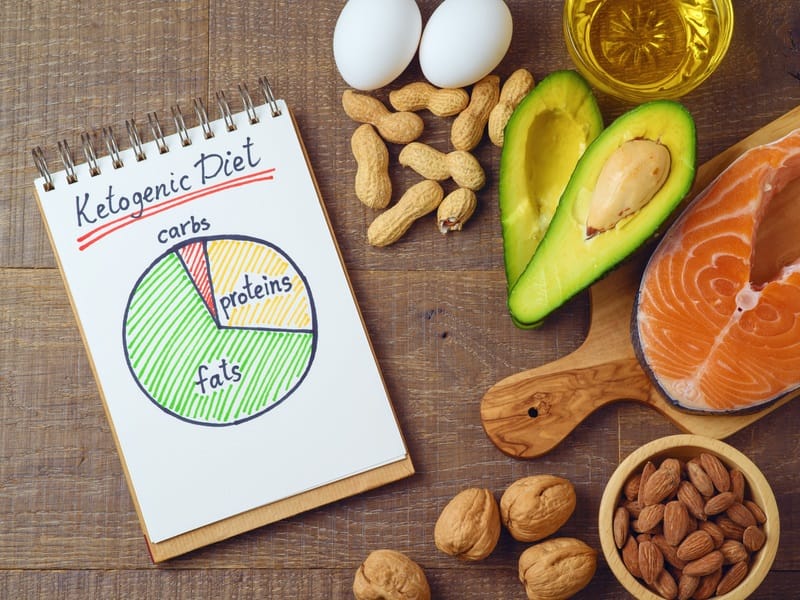The ketogenic diet, commonly known as the keto diet, has gained significant popularity in recent years for its potential benefits in weight loss and managing certain health conditions, including diabetes. For individuals with diabetes, managing blood sugar levels is crucial, and the keto diet’s low-carbohydrate approach may offer some advantages. In this article, we will explore how the ketogenic diet can impact diabetes, its potential benefits, risks, and practical tips for those considering this dietary approach.
1. What is the Ketogenic Diet?
The ketogenic diet is a high-fat, low-carbohydrate diet that encourages the body to enter a metabolic state known as ketosis. In ketosis, the body primarily burns fat for energy instead of carbohydrates. The typical macronutrient breakdown of the keto diet is:
- 70-75% fat
- 20-25% protein
- 5-10% carbohydrates

By drastically reducing carbohydrate intake, the body is forced to use fat as its primary energy source, leading to the production of ketones, which are used for energy.
2. Understanding Diabetes
Diabetes is a chronic condition characterized by elevated blood sugar levels due to either the body’s inability to produce insulin (Type 1 diabetes) or insulin resistance (Type 2 diabetes). Insulin is a hormone that helps regulate blood sugar levels by allowing glucose (sugar) to enter cells and be used for energy. When insulin production is insufficient or cells become resistant to insulin, glucose remains in the bloodstream, leading to high blood sugar levels.
There are two main types of diabetes:
- Type 1 Diabetes: An autoimmune condition where the immune system attacks and destroys insulin-producing beta cells in the pancreas.
- Type 2 Diabetes: A metabolic disorder where the body becomes resistant to insulin or the pancreas fails to produce enough insulin.
3. The Link Between Ketogenic Diet and Diabetes
The ketogenic diet’s low-carb approach may be beneficial for individuals with diabetes, particularly Type 2 diabetes, by helping to control blood sugar levels. Here’s how the keto diet can impact diabetes management:
3.1. Blood Sugar Control
Reducing carbohydrate intake is one of the most effective ways to manage blood sugar levels. Carbohydrates are broken down into glucose, which enters the bloodstream and raises blood sugar levels. By minimizing carb intake, the keto diet helps stabilize blood sugar levels, reducing the risk of hyperglycemia (high blood sugar).
3.2. Insulin Sensitivity
The ketogenic diet may improve insulin sensitivity, which is particularly beneficial for individuals with Type 2 diabetes. Improved insulin sensitivity means the body can use insulin more effectively, helping to lower blood sugar levels. Some studies have shown that individuals on a keto diet experience a significant reduction in insulin resistance.
3.3. Weight Management
Obesity is a major risk factor for Type 2 diabetes. The ketogenic diet has been shown to promote weight loss, which can help reduce the risk of developing diabetes and improve blood sugar control in those who already have the condition. Weight loss achieved through the keto diet is often attributed to the reduction in appetite due to increased fat intake and the body’s reliance on fat for energy.
3.4. Lowering HbA1c Levels
HbA1c is a measure of average blood sugar levels over the past two to three months. High HbA1c levels indicate poor blood sugar control and increase the risk of diabetes-related complications. The ketogenic diet has been shown to lower HbA1c levels in individuals with Type 2 diabetes, indicating better long-term blood sugar control.
4. Potential Risks of the Ketogenic Diet for Diabetes
While the ketogenic diet offers several benefits for diabetes management, it’s important to be aware of potential risks, especially for individuals with Type 1 diabetes or those on insulin or other glucose-lowering medications.
4.1. Hypoglycemia
Hypoglycemia, or low blood sugar, is a common concern for individuals with diabetes, especially those on insulin or other medications that lower blood sugar. The ketogenic diet’s low-carb nature can lead to a significant drop in blood sugar levels, increasing the risk of hypoglycemia. It’s crucial for individuals on the keto diet to monitor their blood sugar levels closely and adjust their medication as needed under the guidance of a healthcare professional.
4.2. Ketoacidosis
Ketoacidosis is a serious condition that occurs when ketone levels become excessively high, leading to a dangerous acid buildup in the blood. While diabetic ketoacidosis (DKA) is more common in individuals with Type 1 diabetes, it can also occur in those with Type 2 diabetes who follow a ketogenic diet. It’s essential to monitor ketone levels and seek medical attention if symptoms of ketoacidosis, such as nausea, vomiting, and abdominal pain, occur.
4.3. Nutrient Deficiencies
The restrictive nature of the ketogenic diet can lead to nutrient deficiencies, particularly in vitamins and minerals found in carbohydrate-rich foods like fruits, vegetables, and whole grains. Individuals on the keto diet should consider supplementing with vitamins and minerals and ensure they consume a variety of nutrient-dense foods.
5. Practical Tips for Following a Ketogenic Diet with Diabetes
If you’re considering a ketogenic diet for diabetes management, here are some practical tips to help you get started and stay on track:
5.1. Consult a Healthcare Professional
Before starting the ketogenic diet, it’s essential to consult with a healthcare professional, such as a doctor or a registered dietitian, who can guide you on safely implementing the diet while managing your diabetes. They can help you adjust your medication, monitor your blood sugar levels, and ensure you’re meeting your nutritional needs.
5.2. Monitor Blood Sugar Levels
Frequent monitoring of blood sugar levels is crucial when following the ketogenic diet, especially during the initial stages of the diet when your body is adjusting to ketosis. Keep track of your blood sugar readings and be aware of signs of hypoglycemia, such as dizziness, confusion, and shakiness.
5.3. Choose Healthy Fats
While the ketogenic diet is high in fat, it’s important to focus on consuming healthy fats from sources such as avocados, nuts, seeds, olive oil, and fatty fish. Avoid trans fats and limit saturated fats from processed and fried foods, as these can negatively impact heart health.
5.4. Stay Hydrated
The ketogenic diet can have a diuretic effect, leading to increased urination and the loss of electrolytes. Staying hydrated is essential, so drink plenty of water and consider electrolyte supplementation to prevent dehydration and maintain proper electrolyte balance.
5.5. Include Non-Starchy Vegetables
Non-starchy vegetables such as leafy greens, broccoli, cauliflower, and zucchini are low in carbohydrates and rich in essential vitamins, minerals, and fiber. Including these vegetables in your diet can help you meet your nutritional needs while keeping your carbohydrate intake low.
6. Real-Life Success Stories
Many individuals with diabetes have successfully managed their condition with the ketogenic diet. Here are a few real-life success stories:
- John’s Story: John, a 55-year-old man with Type 2 diabetes, struggled with obesity and high blood sugar levels for years. After starting the ketogenic diet, John lost 30 pounds and significantly improved his blood sugar control. His HbA1c levels dropped from 8.5% to 6.0%, and he was able to reduce his medication dosage.
- Sarah’s Story: Sarah, a 40-year-old woman with Type 1 diabetes, was initially hesitant to try the ketogenic diet due to concerns about hypoglycemia. However, after working closely with her healthcare team, she successfully implemented the diet and experienced more stable blood sugar levels, reduced insulin requirements, and improved energy levels.
7. Conclusion
The ketogenic diet offers a promising approach to managing diabetes, particularly Type 2 diabetes, by helping to control blood sugar levels, improve insulin sensitivity, and promote weight loss. However, it’s essential to approach the diet with caution, especially for individuals with Type 1 diabetes or those on glucose-lowering medications. Consulting with a healthcare professional, monitoring blood sugar levels, and making informed food choices are key to successfully following the ketogenic diet for diabetes management.
References
- Westman, E. C., Tondt, J., Maguire, E., & Yancy, W. S. (2018). “Implementing a Low-Carbohydrate, Ketogenic Diet To Manage Type 2 Diabetes Mellitus.” Expert Review of Endocrinology & Metabolism, 13(5), 263-272. doi:10.1080/17446651.2018.1523713.
- Saslow, L. R., Mason, A. E., Kim, S., Goldman, V., Ploutz-Snyder, R., Bayandorian, H., & Moskowitz, J. T. (2017). “An Online Intervention Comparing a Very Low-Carbohydrate Ketogenic Diet and Lifestyle Recommendations Versus a Plate Method Diet in Overweight Individuals with Type 2 Diabetes: A Randomized Controlled Trial.” Journal of Medical Internet Research, 19(2), e36. doi:10.2196/jmir.5806.
- Volek, J. S., & Phinney, S. D. (2012). “The Art and Science of Low Carbohydrate Living: An Expert Guide to Making the Life-Saving Benefits of Carbohydrate Restriction Sustainable and Enjoyable.” Beyond Obesity LLC.
- Paoli, A., Rubini, A., Volek, J. S., & Grimaldi, K. A. (2013). “Beyond Weight Loss: A Review of the Therapeutic Uses of Very-Low-Carbohydrate (Ketogenic) Diets.” European Journal of Clinical Nutrition,


